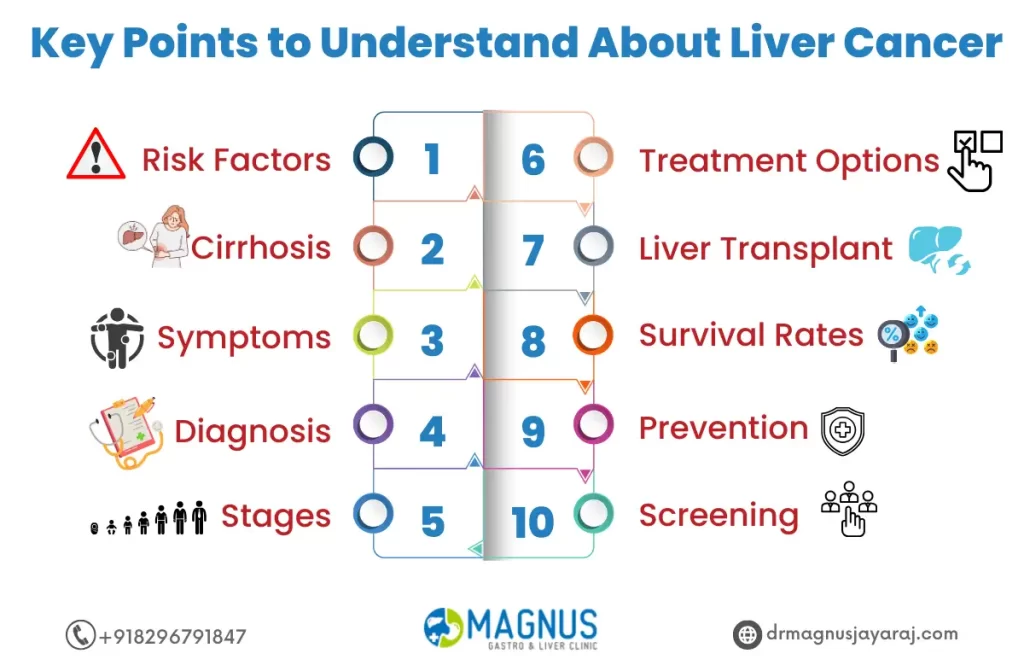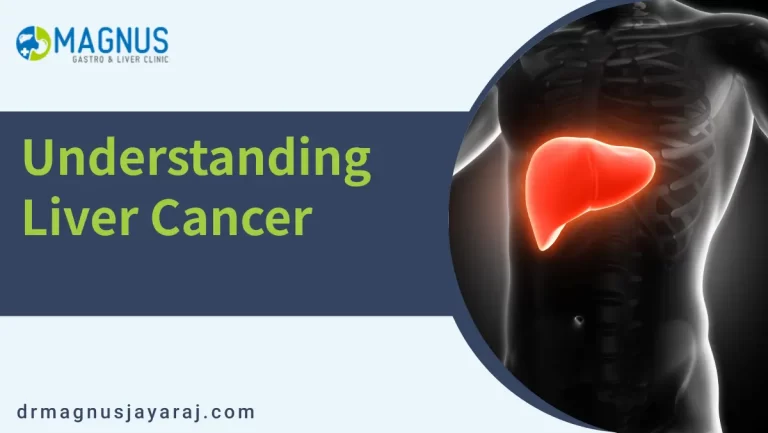Liver cancer is a complex and potentially life-threatening condition that requires expert medical care. In this article, we will delve into the intricacies of liver cancer, its types, causes, risk factors, symptoms, and the importance of seeking liver cancer treatment in Chennai. We’ll also introduce you to a renowned specialist in the field, Dr. Magnus Jayaraj.
Types of Liver Cancer:
Liver cancer encompasses various forms, but two primary types require specialized liver treatment in Chennai.
- Hepatocellular Carcinoma (HCC): HCC, originating in liver cells, is the most common type of liver cancer. For Chennaites, seeking prompt liver cancer treatment in Chennai is crucial when dealing with HCC.
- Cholangiocarcinoma: Cholangiocarcinoma, often simply referred to as “cholangiocarcinoma,” is a type of cancer that originates in the bile ducts. It is a relatively rare but aggressive form of cancer that can occur anywhere along the bile ducts, which are responsible for carrying bile from the liver to the small intestine.
Causes and Risk Factors
Understanding the causes and risk factors associated with liver cancer is essential when considering liver cancer treatment in Chennai. Factors such as chronic liver diseases (often associated with the need for liver treatment in Chennai), viral infections like hepatitis B and C, excessive alcohol consumption, and obesity increase the risk.

Symptoms of Liver Cancer
- Unexplained Weight Loss: Sudden and inexplicable reduction in weight may serve as an early indication of the presence of liver cancer.
- Abdominal Pain: Pain or discomfort in the upper right side of the abdomen may occur as the tumor grows and puts pressure on surrounding organs.
- Abdominal Swelling: An enlarged liver or a buildup of fluid in the abdomen (ascites) can lead to abdominal swelling.
- Jaundice: Yellowing of the skin and eyes (jaundice) is a common symptom of liver cancer. It occurs when the tumor obstructs the bile ducts, causing a buildup of bilirubin in the bloodstream.
- Loss of Appetite: A decreased appetite and feeling full after eating small amounts of food can be associated with liver cancer.
- Fatigue: Persistent fatigue and weakness may be present, often due to the cancer’s impact on overall health.
- Nausea and Vomiting: Some individuals with liver cancer may experience nausea and vomiting, especially if the tumor affects the digestive system.
- White, Chalky Stools: Pale or white-colored stools may indicate a blockage in the bile ducts, which can be caused by liver cancer.
- Itchy Skin: Itching (pruritus) can be a symptom of liver disease, including liver cancer, due to the buildup of bile salts in the bloodstream.
- Dark Urine: Dark urine may result from excess bilirubin in the urine due to liver dysfunction.
Liver Cancer Diagnosis
To embark on the path of liver cancer treatment in Chennai, accurate diagnosis is paramount. Healthcare providers utilize a range of tests, including blood tests, imaging scans, and biopsies, to confirm the presence of liver cancer.
Options – Liver Cancer Treatment in Chennai
Chennai offers a wide array of advanced treatments for liver cancer, and one expert in this field is Dr. Magnus Jayaraj. Treatment options may include surgery, chemotherapy, radiation therapy, targeted therapy, and in some cases, liver transplantation. The choice of treatment depends on factors like the stage of cancer and the patient’s overall health.
Liver Cancer Prevention
- Get Vaccinated: If you are at risk of hepatitis B, consider getting vaccinated. The efficacy of the hepatitis B vaccine in preventing infection is notably high.
- Practice Safe Sex: Engaging in safe sexual practices can reduce the risk of contracting hepatitis B and C, which are sexually transmitted infections that can lead to liver cancer.
- Avoid Sharing Needles: If you use intravenous drugs, avoid sharing needles and other drug paraphernalia to prevent hepatitis C infection.
- Maintain a Healthy Weight: Maintaining a healthy weight through a well-balanced diet and consistent physical activity is essential, as obesity is a known risk factor for liver cancer.
- Include a Healthy Diet: Consume a healthy diet that can be obtained from fruits, vegetables, whole grains, and lean proteins. Limit your intake of processed foods, sugary beverages, and high-fat foods.
Meet Dr. Magnus Jayaraj
When it comes to liver cancer treatment in Chennai, one name stands out – Dr. Magnus Jayaraj. With years of experience and expertise in liver management, Dr. Magnus Jayaraj has been a beacon of hope for many patients. His commitment to delivering top-notch liver treatment in Chennai has earned him a stellar reputation.
Diagnosis of Liver Cancer
The diagnosis of liver cancer involves a comprehensive approach using various imaging and diagnostic techniques to accurately identify and evaluate the disease. Following are the key diagnostic methods:
- Ultrasound: Often the first step, it helps in detecting liver tumors.
- CT/CAT Scan: Provides detailed images of the liver and surrounding structures, assisting in identifying tumors and their spread.
- Magnetic Resonance Imaging (MRI): Offers detailed images of soft tissues, useful for a thorough examination of the liver.
- Angiogram: Helps in examining blood vessels and the blood supply to tumors.
- Laparoscopy Surgery: Provides a direct view of the liver and nearby organs, often used for staging cancer.
- Biopsy: The definitive way to diagnose liver cancer, where tissue samples are examined under a microscope.
- Molecular Testing: Analyzes liver cancer cells for specific genetic changes to guide treatment options.
Treatment options
Treatment options for liver cancer depend on the stage of the disease, the patient’s overall health, and the specific characteristics of the cancer. The main treatment modalities include:
- Surgical Treatment: Removes the tumor along with a portion of healthy liver tissue.
- Liver Transplant: Suitable for cases where the cancer is confined to the liver and not suitable for surgery.
- Medication Therapy and Management: Includes targeted drug therapy and chemotherapy to manage cancer.
- Radiation Therapy: Employs high-energy radiation to target and eliminate cancer cells.
- Cryotherapy: Involves freezing the cancer cells to kill them.
These diagnostic tools and treatment options represent the standard protocols in managing liver cancer, offering patients a chance for effective treatment and management of the disease.
Self-management
Limiting Alcohol Intake: Excessive alcohol consumption is a known risk factor for liver cancer. Reducing alcohol consumption can help minimise this risk. For men, moderate alcohol consumption is generally considered to be up to two drinks per day, and for women, up to one drink per day.
Being Aware of Hepatitis B Transmission: Understanding the modes of hepatitis B transmission is crucial for prevention. Avoiding practices such as sharing contaminated needles, having unprotected sex with infected individuals, and practicing safe blood transfusion procedures can help prevent the spread of hepatitis B.
Avoiding Aflatoxin Exposure: Aflatoxins are toxins produced by certain molds that can contaminate crops, particularly nuts and grains. Chronic exposure to aflatoxins is associated with an increased risk of liver cancer. Measures to reduce aflatoxin exposure include storing food properly, using good agricultural practices, and avoiding consumption of moldy or contaminated food.
Diet and Nutrition
- Emphasize Nutrient-Rich Foods: Include a variety of fruits and vegetables to ensure a diverse range of vitamins and minerals. Choose whole grains, such as brown rice, quinoa, and whole wheat, for fiber and energy.
- Moderate Protein Intake: Consume lean protein sources like poultry, fish, beans, and tofu. Protein is essential for tissue repair, especially important during cancer treatment.
- Healthy Fats: Opt for sources of healthy fats, such as avocados, nuts, seeds, and olive oil. Limit saturated fats found in red meat and processed foods.
- Hydration: Stay well-hydrated, as this is important for overall health and can help manage potential side effects of treatment.
- Limit Sodium: Reduce salt intake to help manage fluid retention, a common issue in liver cancer patients.
Conclusion
Understanding liver cancer is vital for individuals and their families. Early detection, timely intervention, and access to specialists like Dr. Magnus Jayaraj are crucial for improved outcomes. If you or someone you know requires liver cancer treatment in Chennai, don’t hesitate to consult with Dr. Magnus Jayaraj or other experienced healthcare professionals who can provide personalized care and support.
Check out Best Liver Transplant Surgeon in India.

